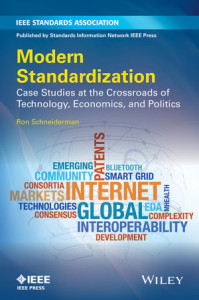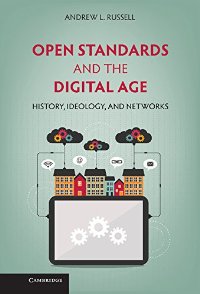The following books may be of interest to students of Standards and professors.
 Modern Standardization: Case Studies at the Crossroads of Economics, Technology and Politics
Modern Standardization: Case Studies at the Crossroads of Economics, Technology and Politics
by Ron Schneiderman; Wiley, 2015. (Purchase Online)
About the Book:
This book includes a collection of standards-specific case studies. The case studies offer an opportunity to combine the teaching preferences of educators with the goals of the SEC (Standards Education Committee); providing students with “real-world” insight into the technical, political, and economic arenas of engineering.
- Encourages students to think critically about standards development and technology solutions
- Reinforces the usage of standards as an impetus for innovation
- Will help understand the dynamics and impacts of standards.
This book is intended for professors, undergraduates and graduate students of Engineering, as well as business undergraduates, law school students and professors, and those with a general interest in business.
A curriculum guide is available to instructors who have adopted the book for a course. To obtain the guide, please send a request to: ieeeproposals@wiley.com.
About the Author
Ron Schneiderman has been covering technology and business management issues for more than 40 years. He is a contributing editor to Electronic Design Magazine; Vision, the flagship magazine of the Consumer Electronics Association; IEEE Spectrum, IEEE Spectrum Online and IEEE Signal Processing Magazine.
 Open Standards and the Digital Age: History, Ideology, and Networks (Cambridge Studies in the Emergence of Global Enterprise)
Open Standards and the Digital Age: History, Ideology, and Networks (Cambridge Studies in the Emergence of Global Enterprise)
by Andrew Russell; Cambridge University Press, 2014. (Purchase Online)
About the Book
How did openness become a foundational value for the networks of the twenty-first century? Open Standards and the Digital Age answers this question through an interdisciplinary history of information networks that pays close attention to the politics of standardization. For much of the twentieth century, information networks such as the monopoly Bell System and the American military’s Arpanet were closed systems subject to centralized control. In the 1970s and 1980s, however, engineers in the United States and Europe experimented with design strategies to create new digital networks. In the process, they embraced discourses of “openness” to describe their ideological commitments to entrepreneurship, technological innovation, and participatory democracy. The rhetoric of openness has flourished – for example, in movements for open government, open source software, and open access publishing – but such rhetoric also obscures the ways the Internet and other “open” systems still depend heavily on hierarchical forms of control.
About the Author
Andrew L. Russell is an Assistant Professor of History and Director of the Program in Science & Technology Studies in the College of Arts & Letters, Stevens Institute of Technology, Hoboken, New Jersey. His work has appeared in journals such as IEEE Spectrum, Information and Culture, Technology & Culture, and the IEEE Annals of Computing. He has been awarded fellowships from Duke University’s John Hope Franklin Humanities Institute, the University of Minnesota’s Charles Babbage Institute, the Association for Computing Machinery, the Institute for Electrical and Electronics Engineers, and the American Society for Information Science and Technology. Russell earned a PhD from The Johns Hopkins University (2007), MA from the University of Colorado, Boulder (2003), and BA from Vassar College (1996).
